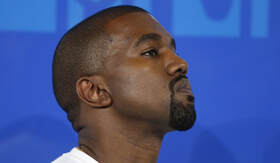
If his conversion is sincere, is there any doubt that he’s “free indeed”? In Edgar Allen Poe’s harrowing short story, The Premature Burial, a cataleptic man worries that his bouts of unconsciousness will be misinterpreted by the medical establishment as a sign that he has died, and that he will accordingly be buried alive. In one particularly jarring moment in the story, the narrator is awakened in the dark after a cataleptic episode:
At length the slight quivering of an eyelid, and immediately thereupon, an electric shock of a terror, deadly and indefinite, which sends the blood in torrents from the temples to the heart. And now the first positive effort to think. And now the first endeavor to remember. And now a partial and evanescent success. And now the memory has so far regained its dominion, that, in some measure, I am cognizant of my state. I feel that I am not awaking from ordinary sleep. I recollect that I have been subject to catalepsy. And now, at last, as if by the rush of an ocean, my shuddering spirit is overwhelmed by the one grim Danger — by the one spectral and ever-prevalent idea. When the narrator opens his eyes, he regains his faculties one by one until that horrible moment when he announces: “I am cognizant of my state.”
Woke, if you like.
Religious conversions tend to proceed the same way. The convert is taken first by impulse, the inborn instinct toward the supernatural, the soul’s longing for purpose. Next, thought: the rationalizing of the spiritual impulse, earnest contemplation of the divine. Then, memory and subsequent dread, recalling and lamenting one’s former self. The convert confronts “the one grim Danger — by the one spectral and ever-prevalent idea” that he might be lost, damned, or otherwise beyond hope. Then, as it does for Poe’s narrator when he realizes he is actually in the “cabin of a small sloop lying at anchor in the stream,” comes relief.
Kanye West’s conversion has followed the same basic schema. First, West felt the urge for meaning. After his hospitalization in 2016 for psychosis and bipolar disorder, West left the hospital starving for something that would give him order and purpose. That impulse begot the thought that perhaps the one worthy of worship was other than Kanye West. The rapper announced that his faith required his “being in service to Christ,” and “radical obedience” to God — a radical departure from the self-obsessed Ye of years past.
(Read More)
At length the slight quivering of an eyelid, and immediately thereupon, an electric shock of a terror, deadly and indefinite, which sends the blood in torrents from the temples to the heart. And now the first positive effort to think. And now the first endeavor to remember. And now a partial and evanescent success. And now the memory has so far regained its dominion, that, in some measure, I am cognizant of my state. I feel that I am not awaking from ordinary sleep. I recollect that I have been subject to catalepsy. And now, at last, as if by the rush of an ocean, my shuddering spirit is overwhelmed by the one grim Danger — by the one spectral and ever-prevalent idea. When the narrator opens his eyes, he regains his faculties one by one until that horrible moment when he announces: “I am cognizant of my state.”
Woke, if you like.
Religious conversions tend to proceed the same way. The convert is taken first by impulse, the inborn instinct toward the supernatural, the soul’s longing for purpose. Next, thought: the rationalizing of the spiritual impulse, earnest contemplation of the divine. Then, memory and subsequent dread, recalling and lamenting one’s former self. The convert confronts “the one grim Danger — by the one spectral and ever-prevalent idea” that he might be lost, damned, or otherwise beyond hope. Then, as it does for Poe’s narrator when he realizes he is actually in the “cabin of a small sloop lying at anchor in the stream,” comes relief.
Kanye West’s conversion has followed the same basic schema. First, West felt the urge for meaning. After his hospitalization in 2016 for psychosis and bipolar disorder, West left the hospital starving for something that would give him order and purpose. That impulse begot the thought that perhaps the one worthy of worship was other than Kanye West. The rapper announced that his faith required his “being in service to Christ,” and “radical obedience” to God — a radical departure from the self-obsessed Ye of years past.
(Read More)

 RSS Feed
RSS Feed
